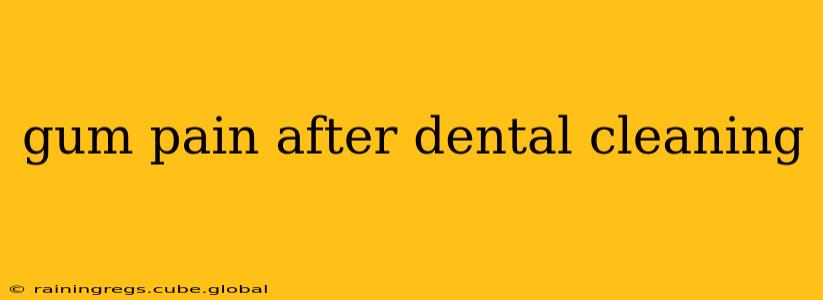Experiencing gum pain after a dental cleaning is more common than you might think. While a professional cleaning is crucial for maintaining good oral hygiene, it can sometimes cause temporary discomfort. Understanding the causes of this pain, how to manage it, and steps to prevent it in the future is key to a healthy and happy smile. This comprehensive guide will address common concerns and provide valuable insights into post-cleaning gum sensitivity.
Why Do My Gums Hurt After a Dental Cleaning?
Several factors can contribute to gum pain following a dental cleaning. The most common culprits include:
-
Gum inflammation (gingivitis): The cleaning process itself can temporarily irritate already inflamed gums. If you have existing gingivitis, the procedure might cause some soreness as the hygienist removes plaque and tartar buildup that's irritating the gum tissue.
-
Aggressive cleaning: While rare with experienced professionals, overly vigorous cleaning can traumatize the gums, leading to sensitivity and pain. This can manifest as bleeding gums and tenderness.
-
Deep cleaning (scaling and root planing): This more involved procedure is necessary for those with advanced gum disease (periodontitis). It involves removing plaque and tartar from below the gum line, which can naturally cause more significant discomfort and potential sensitivity afterward.
-
Underlying gum disease: If you experience persistent or severe gum pain after a cleaning, it may indicate an underlying gum disease that requires further attention from your dentist.
-
Sensitivity to polishing paste: Some individuals might have an allergic reaction or sensitivity to the polishing paste used during cleaning. This can result in irritation and pain.
How Long Does Gum Pain After a Dental Cleaning Last?
The duration of gum pain after a dental cleaning varies depending on the individual, the cleaning's intensity, and the presence of pre-existing conditions. Most people find that the discomfort subsides within 24-48 hours. However, if the pain persists for more than a few days, or worsens, it's crucial to consult your dentist.
What Can I Do to Relieve Gum Pain After a Dental Cleaning?
Several home remedies can help alleviate gum discomfort after a professional cleaning:
-
Saltwater rinse: Rinsing your mouth with warm salt water (1/2 teaspoon salt in 8 ounces of warm water) several times a day can help soothe irritated gums. The salt's antiseptic properties help reduce inflammation.
-
Over-the-counter pain relievers: Medications like ibuprofen or acetaminophen can help manage pain and inflammation. Always follow the dosage instructions on the packaging.
-
Cold compress: Applying a cold compress to your cheek can help reduce swelling and numb the affected area.
-
Gentle brushing and flossing: Continue your regular oral hygiene routine, but be extra gentle to avoid further irritating your gums.
-
Avoid irritating foods: Steer clear of spicy, acidic, or excessively hot foods and beverages that can aggravate sensitive gums.
Is Gum Pain After a Dental Cleaning Normal?
Some degree of gum discomfort after a dental cleaning is quite common, particularly if you have existing gum inflammation. However, severe or persistent pain is not normal and warrants a call to your dentist. Your dentist can assess the situation, rule out any underlying issues, and offer further guidance.
When Should I See a Dentist About Gum Pain After Cleaning?
You should contact your dentist if:
- The pain is severe and doesn't improve within a few days.
- You experience excessive bleeding.
- You notice swelling or pus around your gums.
- You have persistent bad breath.
- You experience difficulty chewing or swallowing.
How Can I Prevent Gum Pain After Future Dental Cleanings?
Prevention is key! Here are some ways to minimize gum sensitivity after future dental cleanings:
-
Maintain excellent oral hygiene: Regular brushing, flossing, and the use of an antimicrobial mouthwash can significantly reduce plaque and tartar buildup, making cleanings less aggressive.
-
Inform your dentist about sensitivities: Let your dentist or hygienist know about any existing gum sensitivities or concerns you may have before the cleaning. This allows them to adjust their technique accordingly.
-
Schedule regular cleanings: Regular checkups and cleanings help prevent the buildup of plaque and tartar, minimizing the need for more intensive cleanings that may cause more discomfort.
By understanding the causes, remedies, and preventative measures surrounding gum pain after a dental cleaning, you can ensure your dental health remains in optimal condition and maintain a comfortable smile. Remember, regular communication with your dental professional is crucial for addressing any concerns and maintaining your oral well-being.
